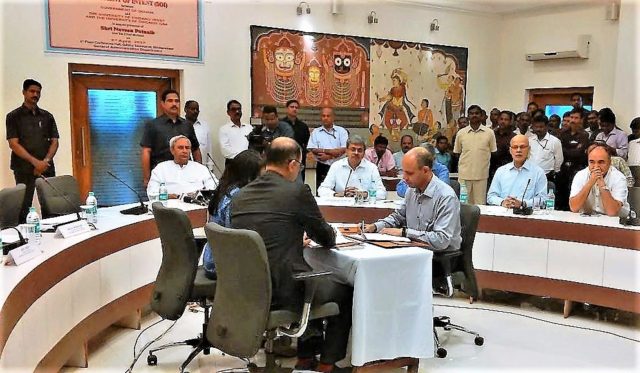April 3rd, 2017, India: The Government of Odisha collaborated with the University of Chicago and the University of Chicago Trust in India to sign a statement of intenton April 3, 2017to advance its commitments for new research, knowledge, and capacity-building partnerships. This partnership will enable the University of Chicago’s Center in Delhi to work closely with the Government of Odisha in carrying out research, impact evaluations, and pilot project implementation in the sectors of energy and environment, health, and water & sanitation through the Energy Policy Institute at the University of Chicago (EPIC-India) and the Tata Centre for Development (TCD).

This partnership will also facilitate knowledge sharing and capacity development of personnel and institutions, and assist in the development of Odia Virtual Academy for digitization, preservation and improved access to archival material through the University of Chicago Library.
As part of the partnership, EPIC-India, a satellite office of the Energy Policy Institute at the University of Chicago focused on working with Indian policymakers tackle energy-related challenges, will be setting up a knowledge cell wherein Bhubaneshwar-based researchers will work closely with state government officials in designing innovative energy and environment solutions. The cell will be housed within the State Pollution Control Board, Odisha.
Shri Naveen Patnaik, Hon’ble Chief Minister of Odisha, during the signing of Statement of Intent, said, “The world is undergoing fast changes cutting across various fields and the changing paradigms are evident and prominently visible. The future will be driven by the knowledge and technology-centric solutions. Hence, knowledge partnerships between premier Universities and the policy makers’ in Governments across the Globe have become an important imperative. As Odisha is marching towards its Vision for the future, such collaborations will have to become an integral part of our planning process.”
“It is a privilege to work with the Government of Odisha, and we are very optimistic that the partnership will result ininnovative solutions to critical energy and environment challenges in the state,increased capacity of personnel and institutions, and improved preservation of and access to archival material,” said Dr. Balaji Srinivasan, Associate Provost and Senior Advisor to the President at the University of Chicago. He added, “It is through partnerships like these that the University of Chicago is creating enduring impact in South Asiathrough policies backed by data-driven research and catalyzingthe interdisciplinary and cross-cultural discourse for which the University is well known.”
The Odisha initiative is one of several that EPIC is working on in India. Professor Michael Greenstone, Director of EPIC, said, “We are already working closely with several state governments in India to conduct real-world policy experiments. In Odisha, we aim to bring our expertise in applied research on innovative policy ideas to develop mechanisms that facilitate increased energy access and reduced health and environmental problems.”
Professor AnupMalani, Faculty Director of the Tata Centre for Development, added, “Our development-focused research, implementation, and training projects in Karnataka, Andhra Pradesh, Telangana, Rajasthan, Delhi and other states position us well to serve Odisha’s needs in health, water and sanitation, and education. We look forward to this productive collaboration.”
The Energy Policy at the University of Chicago (EPIC) and its satellite office in India, EPIC-India, conduct cutting-edge research to test new approaches to expanding energy access and achieving low-cost reductions in pollution through innovative solutions that are most suitable for the Indian context.
The Tata Centre for Development focuses on solving practical problems related to social and economic development in India through an integrated platform comprised of research, implementation and training components.
The University of Chicago Center in Delhi provides a base for research, teaching, and dialogue among scholars from the University of Chicago, across India, and around the world, and is designed to serve scholars across all levels as a working space and gathering place for faculty, students, alumni, and friends of the University
